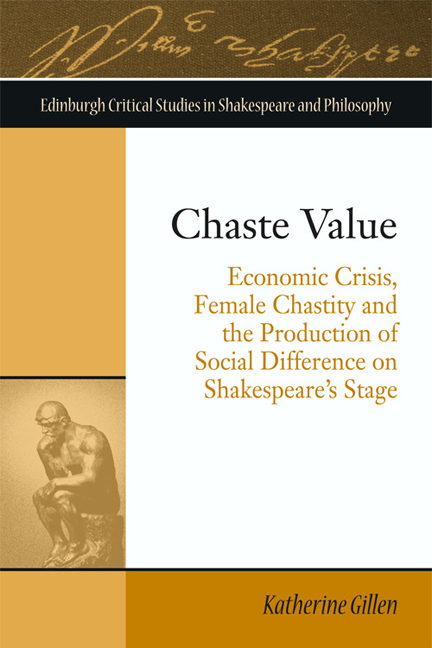 Chaste Value
Chaste Value Published online by Cambridge University Press: 22 December 2017
Like the chaste female body, the black body becomes a locus of concern regarding commoditisation and subjecthood in early modern England. African slavery contributed to a growing association between blackness and personal commodity potential. England's involvement in the African slave trade, though covert, intensified during the late sixteenth century, as English merchants sought to break Portugal's control over the region. Though English policy officially opposed slavery, Elizabeth I provided material support for John Hawkins's slave-trading voyages in 1562, 1564 and 1567. In addition, a sizeable number of black Africans lived in England around the turn of the seventeenth century, a presence attested to by Elizabeth I's attempts to deport them in 1596 and 1601. Recent scholarship has revealed that many of these black residents were considered property, their condition tantamount to slavery. As Imtiaz Habib has demonstrated, slave ownership was ‘informal and surreptitious’ in early modern England but became increasingly prevalent between 1550 and 1660. The question of African slavery, then, was not a distant one for the English, even in the nascent stages of the transatlantic slave trade, but was rather a local concern, as Africans laboured in bonded servitude, subject to personal commoditisation more intense than – but still uncomfortably similar to – that facing white English workers. Because they were often regarded as property, blacks in early modern England bore a particular relation to the increasingly powerful commodity form.
Recent scholarship has emphasised the complexity of race in the early modern period and, in doing so, offers a corrective to the view that race as such did not exist prior to the burgeoning of the slave trade and the advent of scientific racism. As Lara Bovilsky contends, ‘early modern racial logics have much in common with modern and contemporary ones, including most of all those elements that make racial identities unstable and incoherent’. ‘The new emphasis on racial fluidity’, according to Ian Smith, ‘has not only increased our awareness of multiple sites of racialization, but also underscored the significance of nonbiological or nonphenotypical codes’. Race in the early modern period therefore is defined in relation to categories such as religion, nationality, class, geography and language.
To save this book to your Kindle, first ensure [email protected] is added to your Approved Personal Document E-mail List under your Personal Document Settings on the Manage Your Content and Devices page of your Amazon account. Then enter the ‘name’ part of your Kindle email address below. Find out more about saving to your Kindle.
Note you can select to save to either the @free.kindle.com or @kindle.com variations. ‘@free.kindle.com’ emails are free but can only be saved to your device when it is connected to wi-fi. ‘@kindle.com’ emails can be delivered even when you are not connected to wi-fi, but note that service fees apply.
Find out more about the Kindle Personal Document Service.
To save content items to your account, please confirm that you agree to abide by our usage policies. If this is the first time you use this feature, you will be asked to authorise Cambridge Core to connect with your account. Find out more about saving content to Dropbox.
To save content items to your account, please confirm that you agree to abide by our usage policies. If this is the first time you use this feature, you will be asked to authorise Cambridge Core to connect with your account. Find out more about saving content to Google Drive.